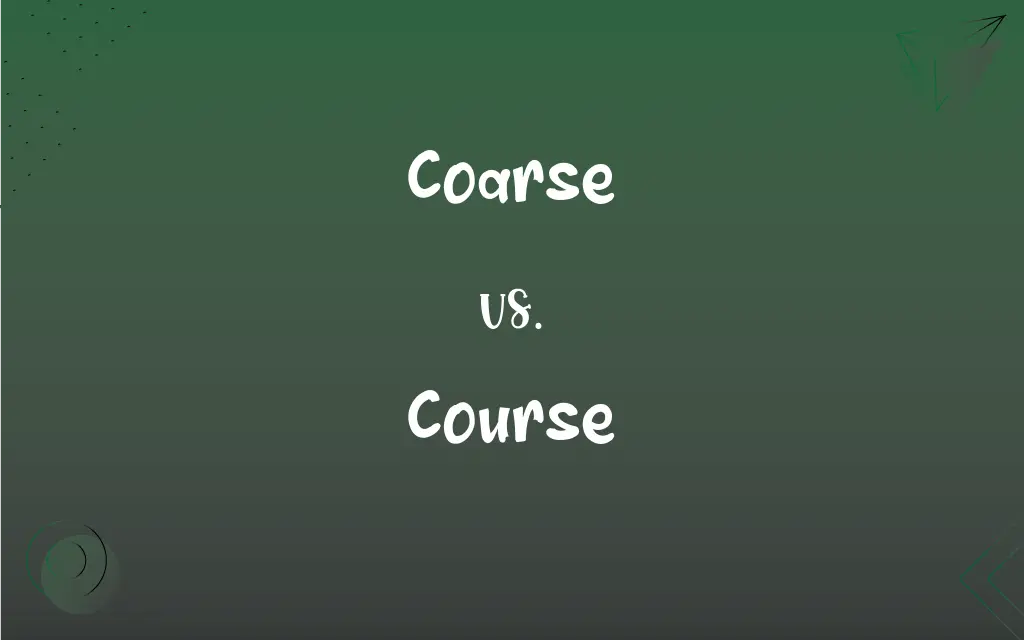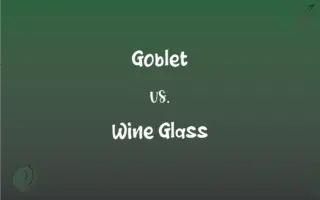Coarse vs. Course: What's the Difference?
Edited by Aimie Carlson || By Janet White || Published on February 12, 2024
"Coarse" refers to rough or crude texture or quality, while "course" can mean a direction, a part of a meal, or a series of lectures or studies.

Key Differences
Coarse describes a rough or uneven texture, like coarse sandpaper. Course, alternatively, can refer to an educational series, like a college course.
Coarse can imply a lack of refinement or crudeness in quality, as in coarse language. Conversely, course can describe a direction or path taken, as in the course of a river.
In terms of materials, coarse is used to describe larger or rougher particles, such as coarse grains. Course can refer to a sequence, particularly in meals, like the main course.
Coarse is often used in physical descriptions, indicating a lack of smoothness. Course, however, is more versatile, used in educational, navigational, and culinary contexts.
Coarse can carry a negative connotation when referring to behavior or language. Course is more neutral and often implies a progression or sequence in various scenarios.
ADVERTISEMENT
Comparison Chart
Primary Meaning
Rough or uneven in texture.
A direction, part of a meal, or series of studies.
Contexts of Use
Material texture, quality.
Education, navigation, dining.
Example Usage
Coarse fabric, coarse grains.
Course of study, main course, course of a river.
Connotations
Often negative when describing behavior/language.
Neutral, related to progression or sequence.
Type of Descriptor
Physical and qualitative.
Descriptive of direction, sequence, or plan.
ADVERTISEMENT
Coarse and Course Definitions
Coarse
Lacking in fineness or delicacy.
He used a coarse brush for the initial painting layer.
Course
A part of a meal served at one time.
The first course was a delicious soup.
Coarse
Rough or uneven in texture.
The coarse fabric was uncomfortable against the skin.
Course
The way in which something progresses or develops.
The course of the disease was rapid and severe.
Coarse
Crude or vulgar in language or manner.
The dialogue in the play was intentionally coarse.
Course
A continuous layer of building material.
Each course of bricks was carefully laid.
Coarse
Consisting of large particles.
The recipe called for coarse ground coffee.
Course
A series of lectures or lessons in a particular subject.
She enrolled in a course on modern art history.
Coarse
Lacking sophistication or refinement.
His coarse manners were out of place at the formal dinner.
Course
The route or direction followed by a ship or aircraft.
The captain set the course for their next destination.
Coarse
Of low, common, or inferior quality.
Course
Development in a particular way; progress
The course of events.
Coarse
Lacking in delicacy or refinement
Coarse manners.
FAQs
Can coarse describe food texture?
Yes, coarse can describe food with a rough or chunky texture, like coarse-ground pepper.
How does course relate to navigation?
In navigation, course refers to the planned or actual path of a vehicle, like a ship or airplane.
What does coarse mean in texture?
Coarse in texture refers to something rough or not smooth.
Is coarse always negative?
Coarse often has a negative connotation, especially when describing language or manners, but not always.
What's the difference in usage between coarse and course?
Coarse is used to describe physical qualities, while course is used for direction, education, or parts of a meal.
How is course used in building construction?
In construction, a course is a horizontal layer of material, like bricks in a wall.
Can coarse be used to describe a person?
Coarse can describe a person’s rough or crude behavior or language.
What does "changing course" mean?
"Changing course" means altering direction or approach in a physical or metaphorical sense.
What is a course in education?
In education, a course is a series of classes or lectures on a particular subject.
What is a course in a meal?
In a meal, a course is a specific set of food items served together at one time.
Can course be used in sports?
Yes, course is used in sports to describe the path or area of a race or golf game.
Is coarse used in geology?
Yes, in geology, coarse describes rock or soil with large particles.
Can course mean progression?
Yes, course can also mean the progression or development of something, like an event.
Does course have a nautical meaning?
Yes, in nautical terms, course refers to the direction in which a ship is being steered.
Can coarse be positive?
Rarely, but it can be positive when a rough texture is desired, like in certain art textures.
What is an academic course?
An academic course is a program of study in a particular subject or field.
How does course relate to water?
Course can refer to the path or channel through which a river or stream flows.
How does coarse relate to textiles?
In textiles, coarse refers to fabrics with a rough texture.
Is coarse only physical?
Primarily, but it can also describe non-physical attributes like language.
Can coarse describe sound?
Yes, coarse can describe a rough or harsh sound.
About Author
Written by
Janet WhiteJanet White has been an esteemed writer and blogger for Difference Wiki. Holding a Master's degree in Science and Medical Journalism from the prestigious Boston University, she has consistently demonstrated her expertise and passion for her field. When she's not immersed in her work, Janet relishes her time exercising, delving into a good book, and cherishing moments with friends and family.
Edited by
Aimie CarlsonAimie Carlson, holding a master's degree in English literature, is a fervent English language enthusiast. She lends her writing talents to Difference Wiki, a prominent website that specializes in comparisons, offering readers insightful analyses that both captivate and inform.







































































